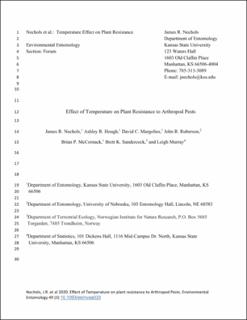Effect of Temperature on Plant Resistance to Arthropod Pests
Nechols, James R.; Hough, Ashley R.; Margolies, David C.; Ruberson, John R.; McCornack, Brian P.; Sandercock, Brett; Murray, Leigh
Peer reviewed, Journal article
Accepted version

Åpne
Permanent lenke
https://hdl.handle.net/11250/2733862Utgivelsesdato
2020Metadata
Vis full innførselSamlinger
- Scientific publications [1392]
Originalversjon
10.1093/ee/nvaa033Sammendrag
Temperature has a strong influence on the development, survival, and fecundity of herbivorous arthropods, and it plays a key role in regulating the growth and development of their host plants. In addition, temperature affects the production of plant secondary chemicals as well as structural characteristics used for defense against herbivores. Thus, temperature has potentially important implications for host plant resistance. Because temperature directly impacts arthropod pests, both positively and negatively, distinguishing direct effects from indirect effects mediated through host plants poses a challenge for researchers and practitioners. A more comprehensive understanding of how temperature affects plant resistance specifically, and arthropod pests in general, would lead to better predictions of pest populations, and more effective use of plant resistance as a management tactic. Therefore, the goals of this paper are to 1) review and update knowledge about temperature effects on plant resistance, 2) evaluate alternative experimental approaches for separating direct from plant-mediated indirect effects of temperature on pests, including benefits and limitations of each approach, and 3) offer recommendations for future research